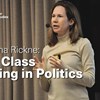dokumentet
Waiting for integration
Open seminar on the European system for receiving and introducing asylum seekers. Migration is in many European countries on the one hand considered a problem, even a threat, on the other hand a possib

How do social norms change?
Social norms change all the time, in all societies. But what determines which norms change and which norms do not?
The Multiple Burdens of Foreign-Named Men—Evidence from a Field Experiment on Gendered Ethnic Hiring Discrimination in Sweden
European Sociological ReviewFull text Abstract Scholars have documented ethnic and gender discrimination across labour markets since the 1970s by using field experiments (correspondence tests) in which

Ludvig Beckman
I am Professor in Political Science at Stockholm University. In 2000 I defended my dissertation at Uppsala University. I participate in the research project "The Boundary Problem in Democratic Theory" t
Modeling the Evolution of Creoles
Language Dynamics and Change, 5(1), 1-51. DOI: 10.1163/22105832-00501005 Abstract Various theories have been proposed regarding the origin of creole languages. Describing a process where only the end res
Who Cleans the Welfare State? Migration, Informalization, Social Exclusion and Domestic Services in Stockholm
The report explores connections between migration, social exclusion, and informalization of the labor market with a focus on domestic services in Stockholm. Through an interview study, the author iden
Movie premiere! A New Society
Why do we need social progress? On July of 2014 a monumental task began as hundreds of the world's leading academics came together to set new standards for a just, secure and healthy global society. T has been tirelessly forming a non-partisan report addressed to all social actors, movements, organizations, politicians, and decision-makers in order to provide an architecture for present and future global issues and crises.
Raya Muttarak: Population Dynamics under Global Climate Change
Register Abstract Australian bushfire in 2020 and severe floods in Western Europe and exceptional heatwaves in North America in summer 2021, to name a few, are examples of extreme events that are docume
Research seminar with Johanna Rickne: The Class Ceiling in Politics
Venue: Institutet för framtidsstudier, Holländargatan 13, 4th floor, Stockholm, or online.Research seminar with Johanna Rickne, professor of Economics at SOFI, Stockholm University.Register hereAbstracPrior studies have documented that working-class individuals rarely become parliamentarians. We know less about when in the career pipeline to parliament workers disappear, and why. We study these questions using detailed data on the universe of Swedish politicians’ careers over a 50-year period. We find roughly equal-sized declines in the proportion of workers on various rungs of the political career ladder ranging from local to national office. We reject the potential explanations that workers lack political ambition, public service motivation, honesty, or voter support. And while workers’ average high school grades and cognitive test scores are lower, this cannot explain their large promotion disadvantage, a situation that we label a class ceiling. Organizational ties to blue-collar unions help workers advance, but only to lower-level positions in left-leaning parties. We conclude that efforts to improve workers’ numerical representation should apply throughout the career ladder and focus on intra-party processes.

Johanna Rickne: The Class Ceiling in Politics
Research seminar with Johanna Rickne, professor of Economics at SOFI, Stockholm University Abstract: Prior studies have documented that working-class individuals rarely become parliamentarians. We kno








